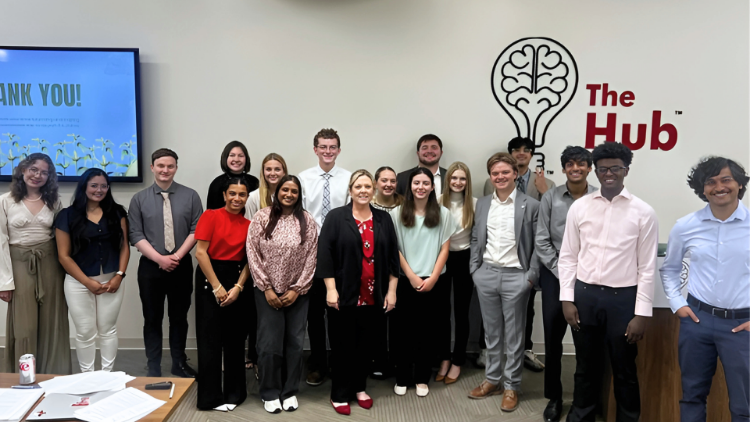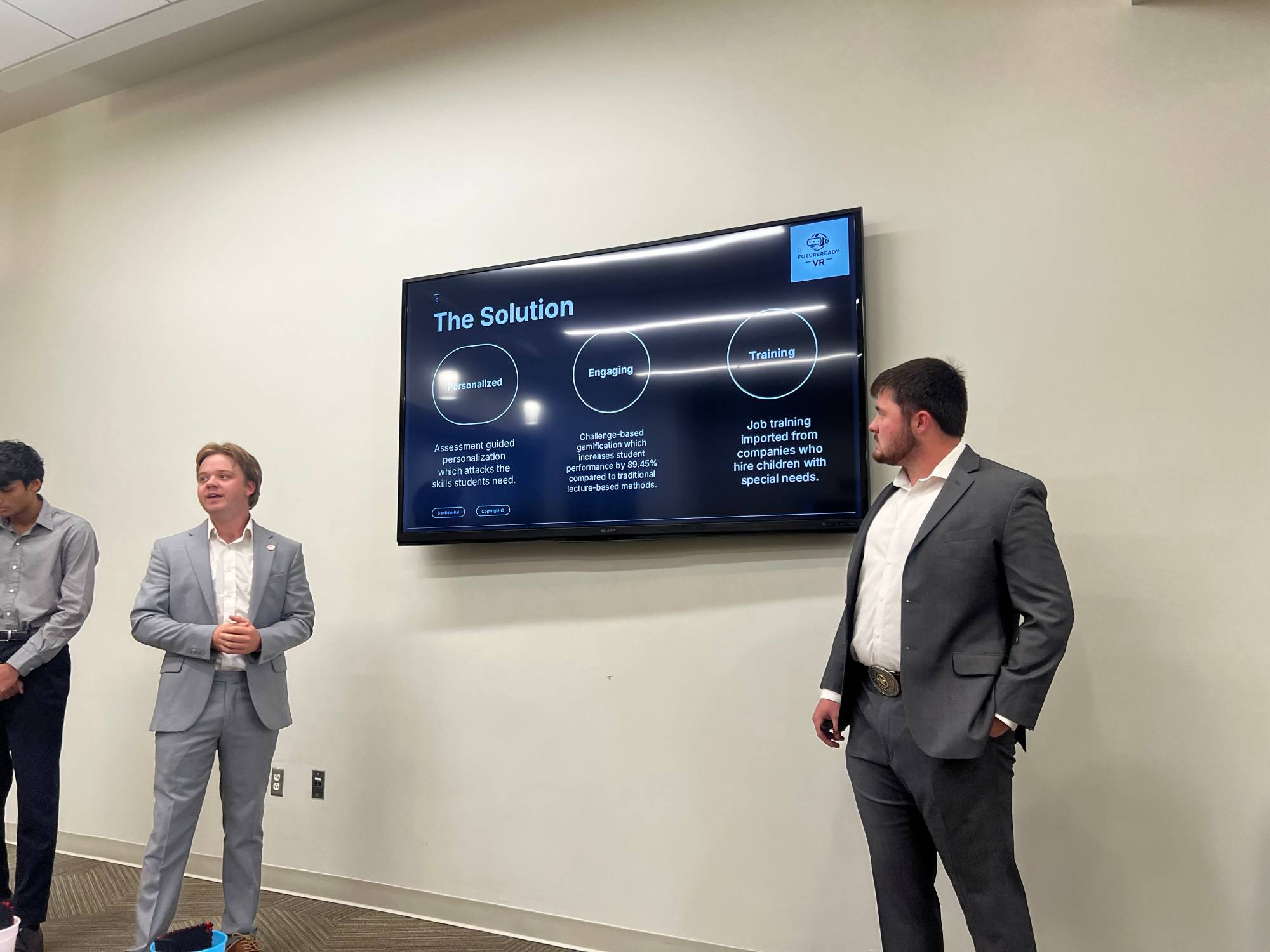
Taysha Williams Teams Up with the Honors College to Spark Student-Led Change
It’s a Wednesday afternoon on the Texas Tech campus and the New Academic Sciences Building classroom isn’t exactly quiet.
Pencils scratch across notebook paper. Pens click as groups brainstorm ideas and propose solutions. The class is 17 students divided into six teams, each tackling a pressing global issue that is meaningful to them. In the middle of it all- offering feedback, asking hard questions, and flashing the occasional encouraging grin- is Taysha Williams, teaching her very first course at Texas Tech: HONS 4302: Social Entrepreneurship: Solve Problems & Change the World.
Taysha is no stranger to teaching entrepreneurship locally and nationally. As the Managing Director of the Texas Tech Innovation Hub, she spends her days helping startup founders turn big ideas into scalable ventures. But teaching an undergraduate course? That was a new adventure.
“I’ve always had a passion for the nonprofit world,” she shared. “So, when Dr. Jill Hernandez, Dean of the Honors College, encouraged me to teach this semester, I knew it was the right time. This class let me merge the two things I love most: entrepreneurship and social impact.”
The course, offered through the Honors College, isn’t just about dreaming up the next big app or pitching to investors in suits. It’s about equipping students to think like changemakers who see a problem and feel empowered to do something about it. In addition to the course-long project to develop a novel solution to a global challenge, Taysha encouraged her students to volunteer within the local community to deepen their understanding of social impact and cultivate empathy towards pressing issues. What this led to? Her students collectively serving 50 hours.
“It’s incredibly fulfilling to watch students evolve,” Taysha said. “You see them go from learning the basics to designing ventures that could make a real difference. They start seeing themselves not just as students, but as problem-solvers.”
Thinking Big, Starting Local
Each team was challenged to tackle a real-world social issue by designing a business venture aligned with the United Nations Sustainable Development Goals (UN SDGs). For Saayna Bhakta, a student in the course, that meant looking closely at the barriers faced by individuals with physical disabilities.
Her team selected SDGs 8 (Decent Work and Economic Growth), 10 (Reduced Inequalities), and 11 (Sustainable Cities and Communities). The issue? Inaccessible transportation.
“I was surprised to see how much of an impact inaccessible transportation has on people with physical disabilities, not just in terms of mobility, but also in limiting their access to job opportunities and basic services,” Saayna said. “Researching this problem has made me more aware of how often people with physical disabilities are excluded from everyday activities, and it has highlighted the importance of designing inclusive systems that support everyone.”
The venture Saayna and her team designed tackled this challenge head-on. But even more transformative than the idea itself was how the course reshaped her mindset.
“I developed a stronger problem-solving mindset,” she said, “focusing on creating solutions that make a meaningful impact. I also learned to approach challenges with resilience and adaptability, skills I'll carry into future classes, careers, and life experiences.”
Role Models and Resilience
A key moment for Saayna came during a guest speaker session with Richard Gaines, an entrepreneur who rebuilt his life from the ground up after incarceration and personal setbacks.
“Richard Gaines changed how I approach problem-solving because he showed us the importance of resilience and thinking outside the box when facing challenges,” she shared. “The real ‘aha!’ moment for me was realizing that success doesn't come from following a set path but from being adaptable and learning from setbacks, even when the odds are against you.”
Taysha intentionally brought in speakers like Richard to model the kind of bold thinking and grit that social entrepreneurship demands.
“We talk a lot about design thinking and empathy in class,” Taysha said. “But hearing it from someone who lived through real adversity hits differently. The students walk away changed.”
More Than a Classroom
What sets HONS 4302 apart is its hands-on approach. Students don’t just write papers, instead they build real business models using the Social Business Model Canvas, a framework that emphasizes both financial sustainability and measurable social impact. They collaborate with local nonprofit organizations, pitch their ideas to peers, and receive feedback from mentors and entrepreneurs at the Innovation Hub.
“Events at the Hub really bring the coursework to life,” Taysha said. “Students get to see how these concepts play out in real ventures, meet founders, and get inspired. It’s not just theory, it’s practice.”

By the end of the semester, students leave with more than just grades- they walk away with confidence, community, and a whole new way of looking at the world. And it's not just the students this class has had an impact on. Throughout the semester guest speakers, leaders from local nonprofits and entrepreneurs launching startup companies, came and shared their journeys with students. The kicker? The students impressed the speakers so much that a few even showed up to cheer on and listen to the six teams' final pitches.
A Course with a Ripple Effect
For Taysha, the joy of teaching this course is rooted in those small moments- the light bulb turning on during a team brainstorm, the shy student who finds their voice in a group pitch, the emails she gets from students still thinking about how they make their projects a reality.
“This class is about showing students they don’t have to wait for someone else to fix the world’s problems,” she said. “You can’t just sit back and hope. You have to take action and this course gives them the tools to do it.”
As for what’s next?
Let’s just say this first-time professor might be hooked.
“It’s been one of the most rewarding experiences of my career,” Taysha said. “Thanks to Dr. Hernandez and the incredible support from the Honors College, I’ve seen what’s possible when we invest in our students not just as scholars, but as future leaders. I’m excited to see where they go from here.”
